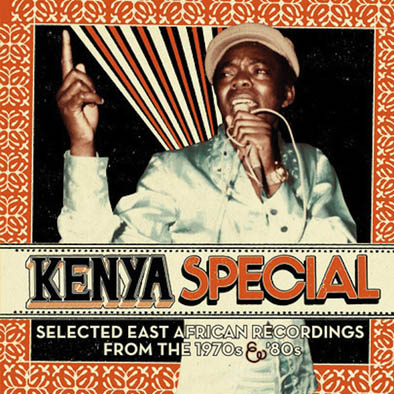 There are certainly a number of fine labels currently trawling record bins in Jamaica, Africa, South America, and Southeast Asia in search of great lost, unheard, or forgotten music, but Soundway compilations (particularly the African ones) are almost always my favorites.  The reason for that is quite simple: Miles Cleret and his collaborators are especially adept at 1.) knowing a great song when they hear it,  and 2.) making damn sure that there are a number of such songs on every single collection they release.  Unsurprisingly, Kenya Special continues that hot streak, being every bit as essential as their classic Ghana and Nigeria collections.
There are certainly a number of fine labels currently trawling record bins in Jamaica, Africa, South America, and Southeast Asia in search of great lost, unheard, or forgotten music, but Soundway compilations (particularly the African ones) are almost always my favorites.  The reason for that is quite simple: Miles Cleret and his collaborators are especially adept at 1.) knowing a great song when they hear it,  and 2.) making damn sure that there are a number of such songs on every single collection they release.  Unsurprisingly, Kenya Special continues that hot streak, being every bit as essential as their classic Ghana and Nigeria collections.
Unlike some other compilations of great regional African music, the 32 songs compiled for Kenya Special are rooted in a time of relative prosperity and stability.  Kenya was far from a dull place politically in the '60s, owing to their newfound independence from England and a war with ethnic Somalis, but Nairobi was very much a thriving city with a booming tourist industry by the time of these recordings.  Tourists, of course, need to be entertained, so many talented West African musicians wound up playing Afro-beat and American soul covers in the city's finer hotels.  Predictably, that fateful collision of cultures eventually yielded its own thing, as intrepid musicians soon began finding ways to combine those tourist-friendly sounds with their own distinctively Kenyan styles of Benga and Rumba/Lingala (and they also found that Nairobi was an easy place to quickly record and release records).  While this compilation includes a few classic examples of those two "native" styles, most of the focus is upon the less-easily categorized cross-pollination that followed.
As a non-expert in African music, I found the sheer number of intermingling styles (chakacha rhythms, taarab music, etc.), regions, languages, and bands represented on Kenya Special a bit overwhelming, but my dim understanding of what is actually happening did not prevent me from enjoying the music at all.  While there is certainly lot of variety on display, the primary recurring stylistic theme that most of these songs share is a tight, killer rhythm section (as well as a refreshing tendency towards relative brevity).  In general, combining a traditional, percussion-heavy African rhythm with a thick, funky bass line seems to be an especially winning formula (Loi Toki Tok's "Ware Wa" being a fine example), particularly when that groove is bolstered by instrumental flourishes like great sax playing (Slim Ali & the Famous Hodi Boys) or dueling flute and organ solos (The Mombasa Vikings).  Other bands shine in very different ways though, such as The Lulus Band with the clean guitar stabs and train-like snare roll of "Ngwendeire Guita."
The most memorable pieces, however, take a bit more dramatic detours from the expected.  Predictably, my favorite piece on the entire album (Orchestre Baba National's "Sweet Sweet Mbombo") opens with an amusingly ridiculous monologue in heavily accented English, but everything else about the song is equally spectacular.  Hafusa Abasi & Slim Ali's "Sina Raha," on the other hand, stands out both for being one of the only songs to feature a female vocalist and for being noticeably influenced by Arabic music.  The Rift Valley Boys also tread rather unique territory with their "Tiga Kurira," which flogs an insistently moronic groove so thoroughly and so exuberantly that it actually becomes perversely infectious and likable.
As is usual for Soundway, the liner notes are very informative, thorough, and well-written, providing all of the context and biographical information that I could possibly need to delve into these artists more thoroughly on my own.  Sadly, no one has a particularly lurid or improbable backstory this time around, but it was still fascinating to learn that artists worldly enough to be appropriating American funk and soul could still write songs discouraging women from drinking alcohol or marrying outside their immediate community.  I was also surprised to learn that many songs were sung in Swahili rather than local dialects in order to avoid alienating rival tribes.  In any case, the music itself (compiled by Miles Cleret, Johan Fredrik Lavik and Rickard Masip) could not be better.  The worst I can say is that a lot of the good songs sound similar to one another and that there are not as many truly great songs as there have been on some of Soundway's other comps (i.e. The World Ends), but those "flaws" are easily balanced out by a near-total lack of weak or even average material.
- Hafusa Abasi & Slim Ali with The Yahoos Band, "Sina Raha"
- Orchestre Baba National, "Sweet Sweet Mbombo"
- The Rift Valley Boys, "Tigra Kurira"
 
Read More

